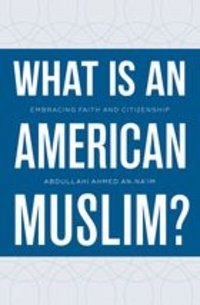An-Na'im's new book calls for moving beyond minority politics
By Patti Ghezzi | Emory Law | Dec 11, 2013 12:12:00 AM

As the Muslim population of the United States grows, debates over how Muslims should engage the civil and political life of the U.S. are increasingly common. Too often, however, this conversation focuses on a narrow concept of shari‘a that is perceived to be incompatible with, or a threat to, the U.S. constitutional system, or it focuses on assimilation of Muslims to an “American” way of life. By juxtaposing “Americanness” and Islam, these conversations assume that American Muslims cannot be faithful to both their religion and their citizenship.
Fortunately, in his new book, What is an American Muslim?: Embracing Faith and Citizenship (Oxford University Press, 2014), Abdullahi An-Na‘im, Charles Howard Candler Professor of Law and Senior Fellow in the Center for the Study of Law and Religion at Emory University, offers a different model in which American Muslims can be fully Muslim and fully American. For An-Na‘im, the key is to move beyond minority politics or “political strategies and practices that are premised on or motivated by one specific identity, religious in this case, to the exclusion of other identities and the dynamic of multiple, overlapping identities.”
An-Na‘im explores the concept of identity and unpacks the ways in which any individual identity is an amalgam of various relationships to others based on many possible affiliations, including politics, race, culture, or religion. Each of these relationships is a part of a person’s identity, and they put each of us in the minority at times and in the majority at times. As An-Na‘im says, “Every citizen of the United States is part of a minority in some respects and of a majority in others. Yet those citizens who think of themselves as members of a minority are keenly aware of it, while those who feel confident in their ‘Americanness’ do not give it much thought.”
Moving beyond minority politics means moving beyond notions of majority and minority that create hierarchies of “Americanness.” Instead, An-Na‘im argues that American Muslims should engage in the civil and political life of the country as citizens informed by their faith, rather than as a community separated by religion. He does not, however, argue that such engagement necessitates a loss of religious identity. Rather, while American Muslims should engage civically and politically as citizens informed by faith, such engagement also affirms religious self-determination, or “the individual experience and the collective expression of a foundational freedom: the freedom of religious belief and practice, subject to the equal rights of other citizens, [including] the right of each Muslim to experience her religious beliefs according to her own convictions and choice.”
An-Na‘im concludes by engaging the work of political theorist Benedict Andersson and arguing that moving beyond minority politic requires “reimagining community.” Reimagining community means both reimagining what Muslim community is “in relation to the Quranic principle of enjoining what is right and combating what is wrong within the America context,” as well as reimaging the national community in light of its many forms of diversity, i.e., reimagining “Americanness.”

